A study originating in Denmark claims to have discovered racial bias in the way that football commentators describe the skills and attributes of players of different skins tones.
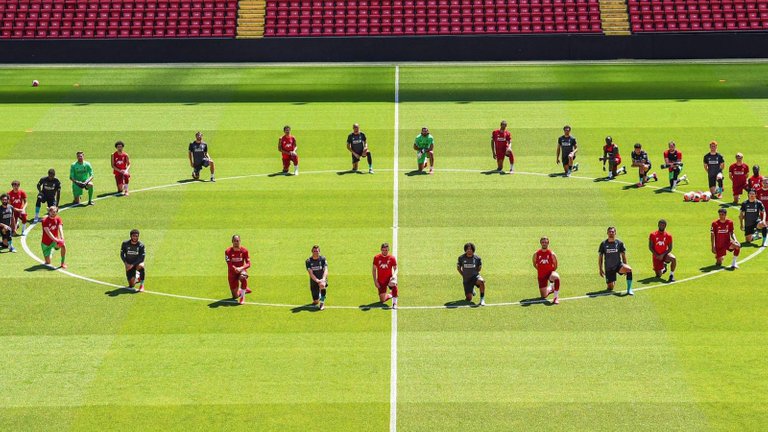
The study itself looked at English commentary from 8 broadcasters covering matches from across Europe's top leagues. Within each game, every player was assigned a skin colour rating from 1-20 based on the statistical database found within the popular computer game Football Manager. For those questioning whether genuine scientific research should be carried out using data from a computer game, Football Manager is often credited within the sport as being an authoritative data set used by coaches and scouts alike to find players with certain attributes. Those with a skin colour rating of 1-11 were deemed to be players of "lighter-skin" while 12-20 were players of "darker-skin".
From the matches themselves, over 2000 pieces of individual commentary and analysis were recorded and analysed. Only in-play commentary was used in the study i.e. pre/post-match analysis back in the studios was not included.
Those pieces of commentary were further categorised by events that could be deemed factual in their nature for example "that's a poor shot wide of the goal by xxxx" or "that was a great cross from xxxx right onto the strikers head" and those that were more subjective and based on opinion. Each of the factual statements was split to determine whether if was a positive statement or a criticism of the player. This control group of factual statements found no discernable difference between comments made about players with lighter or darker skin tone.
However, when the study moved on to consider what it deemed to be subjective opinions given by commentators it found significant differences in the rates which commentators would talk about certain physical, mental and technical abilities and whether those comments were positive or negative towards the player.
Intelligence
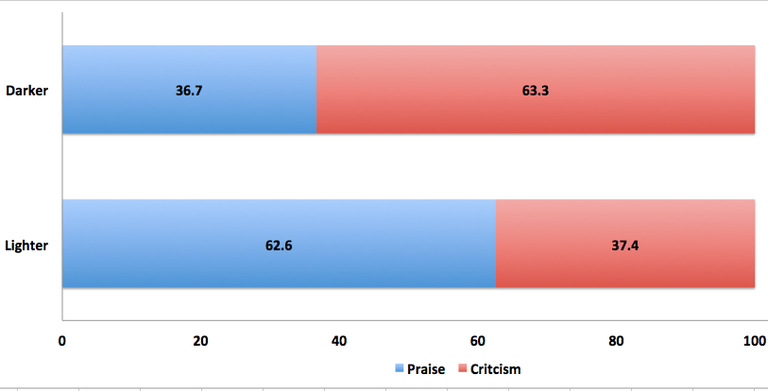
The graph shows praise and criticism in regards to intelligence as a % split by skin tone
In summary, if you are a player with lighter skin you are far more likely to be praised for your perceived intelligent play than you are if you are a player with dark skin. In fact, players with white skin were almost 2.5 times more likely to have a comment made about their intelligence than their black peers.
Physical Attributes and Work Ethic
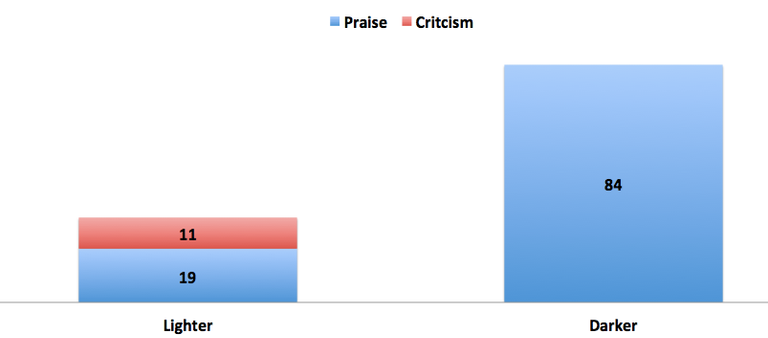
The graph above shows total comments made in regards "speed" and "power" split by skin tone and praise/criticism
The above shows that as a player of darker skin you are almost 3 times more likely to receive a comment about your perceived physical condition. Interestingly not 1 single negative comment was made about darker-skinned players speed or power. However, when speaking about work ethic the opposite was true with players of lighter skin tone almost 3 times as likely to be praised for being "hardworking".
The writers of this study conclude that such bias leads to the damaging stereotype that black athletes are naturally gifted but essentially lazy when compared to their white peers.
Other subjective measures
Other subjective measures that highlighted bias included "quality". Only 8.4% of the total comments made about darker-skinned players referred to their quality in contrast to 12.8% of lighter-skinned players. Within those comments, a player of lighter skin was praised 94% of the time versus a darker-skinned player who could only hope to receive praise 80% of the time.
As with quality, darker-skinned players received significantly fewer comments in regards to their "leadership" (9.68%) compared to players with lighter skin (12.05%). Again, there was a slight bias in terms of positive comments in favour of lighter skin tones (69% v 64%).
Limitations of the study
For me, a couple of the key limitations of this study are centred firstly around how you define objective and subjective criteria. For example, are "speed" and "power" truly subjective qualities. We can certainly measure how fast someone can run and therefore make a fairly objective comment on who is faster than who. Power is perhaps a little more tricky and measures of strength have often been criticised for focusing on upper-body strength (a common criticism within feminist discourse). However, again it seems likely that if you wanted to refine the definition and break it down into further sub-categories you could if you want rank players on various measures of strength or power.
In fact, in the last blog I wrote before this one I made a comparison between a white European full-back and a black African playing the same position and came to the conclusion that the white player was more technically adept than the black player who was better physically (particularly in regards speed) than the white player. I'd like to think that these assertions where made largely off the back of the objective statistics I provided in support of that comparison as opposed to any pre-conceived bias.
A second limitation is that the study has only split footballers by skin tone and not by other definitions of race. I can understand why they have done that because it would be very difficult to define each individual by race using any other category. That being said, I believe that had the study have looked into the comments made about black African players in comparison to black European players, the findings might have demonstrated an even greater bias. For example are we to believe that a black British footballer like Trent Alexander-Arnold doesn't receive a huge amount of praise for his quality and technical ability v a player of black African origin?
Sporting Implications
Beyond the obvious impact for society at large, the report carries several implications for the sport specifically around the game's development on a truly global scale and any ambitions that European countries may hold to get more black coaches and managers into football.
Stereotypes within the sporting world are not new nor are they limited to specific nations or nationalities. For example, we might traditionally think of the German national team as highly-organised, defensively minded and a team whose collective sum is greater than that of its individual parts. Equally, it's not uncommon to think of the English national team as favouring long-ball tactics, a 4-4-2 formation and being bad at penalties.
However, despite these stereotypes European teams, in particular, have had great success over the years in re-inventing their style of football. The successful German side of the last decade has played with much more attacking freedom and individual flair than the stereotype above would suggest and even England helped by the success of their national team at youth level has re-invented itself to have footballers with the tactical awareness and technique to compete on a global stage. In decades gone past we've seen European teams revolutionise the way football is played from the total football of the great Hungarian and Dutch sides to the Italian's catenaccio style or more recently the Spanish tiki-taka.
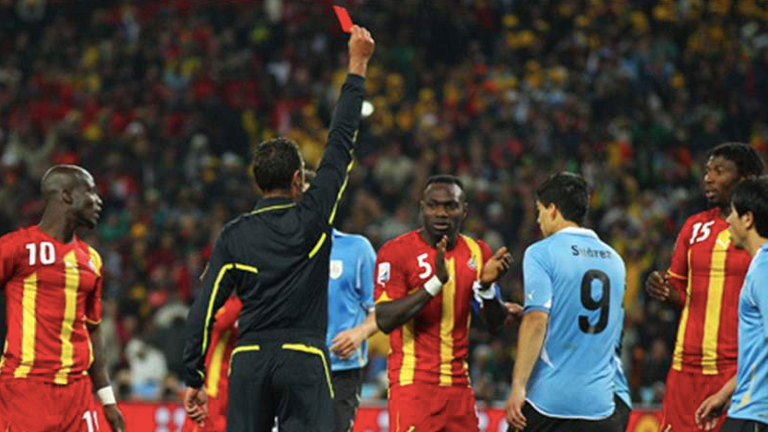
Ghana's run to the Quarter-Finals in 2010 ended in controversy
Can the same be said for African teams? In the 1990s when the likes of Nigeria and Cameroon burst onto the international stage many pundits predicted that an African team would at the very least make the World Cup final if not win the tournament within the next couple of decades. 2 quarter-final appearances in the last 30-years paints a different picture.
There are many reasons why an African side is yet to progress to the latter stages of the biggest sporting contest in the world but racial bias and the stereotypes that bias helps to sustain is undoubtedly one of them. Unlike the examples of European nations above, African football has not developed and refined itself beyond the stereotype of creating players and teams that play to their physical strengths and attributes. The bias demonstrated in the study above is both self-sustaining and self-fulfiling and until the cycle is broken, African football stands little chance of developing beyond its perceived limitations.
Beyond just the development of players, is the development of thinkers about the game. Again, the study highlights why it will be much harder for former players with dark skin to transition into coaching or managerial roles. After-all if the perception is that your main use to the game is your power and pace but that you're not particularly intelligent or that you lack tactical and technical quality then why would you be of any use in the dug-out? We already see this bias manifesting itself as institutional racism within club football in England where the number of black managers and coaches at any one time is not representative of the number of black players.
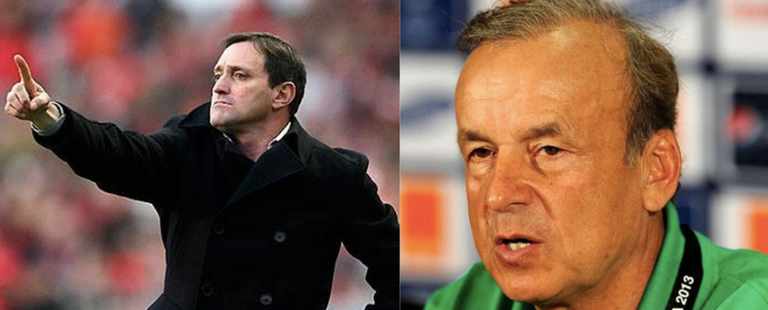
Africa's footballing powerhouses Cameroon and Nigeria both currently employ white European coaches a trend that has been common over the past few decades
Linking back to the implications of footballing development outside of Europe, as long as a racial bias towards non-white coaches prevails, it will further hinder the development of football in areas such as Africa. Again we are left with a self-fulfilling prophecy in the sense that black players can only achieve status at the top level as a result of their physical attributes because they are given less opportunities early in their career to work with talented coaches who might otherwise have improved their technical attributes.
All charts and graphs are my own. All stats and data from the runrepeat study
Hi @talesfrmthecrypt,
Thank you for participating in the #teamuk curated tag. We have upvoted your quality content.
For more information visit our discord https://discord.gg/8CVx2Am
I knew an English coach who came to coach in Africa. The truth is the team was great at practice but on match days played to the crowds and never kept the team tactics. No African side will ever lift the World Cup. Being able to lift a team mentally and win consecutive games is not something that I believe they could do. It is similar to the French National rugby team as they have everything but they don't have the mentality for it.
Given that we see plenty of African footballers winning trophies at club level in European football I’d have to disagree.
Winning mentality is important in the short to medium term but i don’t believe it is the be all and all and never subject to change. After all you’re talking to Spurs supporter. If winning mentality never changed we’d have been a successful club for the past 60 years rather than getting beat by Sheffield United!
I think it is more down to how they play the football locally. Individually they are capable but as a team is where the problem lies. If you watched local football on television here it is like they are all playing for themselves. The ones that make it playing in Europe have learnt the art of playing in a team yet somehow it never filters back here. Coaches pull their hair out as nothing from the training pitch seems to make it's way to match days.
I guess that kind of talent drain is a large part of the reason too. If the best players are continually creamed off the top then it's difficult to sustain any development.
To some extent I wonder if it is the mentality of wanting to get out of the local footballing system that makes those players more selfish and concerned with their individual performance than that of the team.